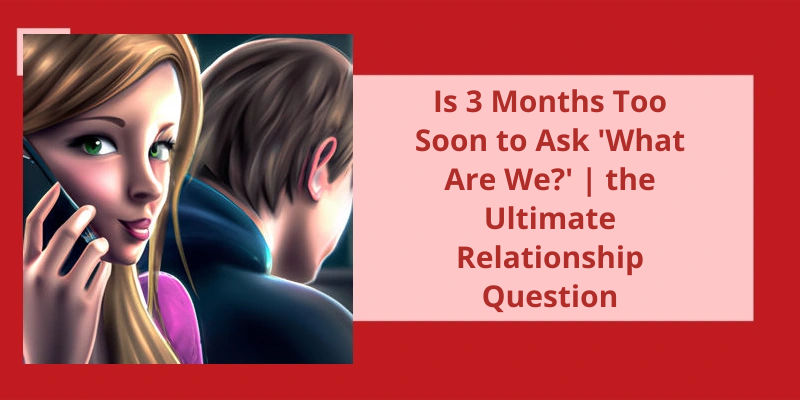In the world of dating, there comes a point where both parties must assess the direction of their relationship. It's common to ask yourself, "Where’s this going?" and "What’re we?" However, there’s no exact timeline for introducing the topic of exclusivity. While many psychologists suggest waiting at least two months, it ultimately depends on the individuals and their connection with one another. Rushing into a commitment too soon may lead to misunderstandings and disappointment. On the other hand, waiting too long can lead to uncertainty and confusion. Ultimately, it's important to communicate openly and honestly with your partner to ensure both of you’re on the same page.
What Happens at 3 Months of Dating?
This level of openness is often mirrored in physical intimacy, as partners feel more comfortable exploring each others bodies and preferences. At the three-month mark, you may find that your busy schedules make it harder to see each other as often as you used to. However, maintaining open communication can help to offset this feeling of distance and ensure that you continue to prioritize your relationship.
At this point, it’s important to start thinking about your future together. This can mean everything from planning trips or discussing long-term goals to starting to introduce each other to friends and family. While it can be tempting to get caught up in the early intensity of a new relationship, taking the time to carve out a shared vision for the future can lay the foundation for a stronger and more enduring partnership.
Of course, every relationship is different, and it’s important to approach the three-month mark with a healthy dose of perspective and flexibility. While it’s natural to be excited about the future, it’s important to remember that relationships take time to develop and grow. Instead of putting pressure on your relationship to meet certain benchmarks at specific points in time, focus on building a strong foundation of trust, respect, and communication that can withstand the challenges and surprises that lie ahead.
How to Handle Disagreements and Conflicts at the Three-Month Mark
- Listen actively and try to understand the other person’s perspective
- Be respectful and avoid using accusatory language
- Find common ground and compromise if possible
- Take a break if the discussion becomes too heated
- Seek third-party mediation if necessary
- Reflect on the conversation and how it can be improved in the future
It’s not uncommon for people to wonder about the timeline of developing feelings in a relationship. While some may feel a strong connection early on, others may take longer to cultivate strong emotions. However, as many couples have experienced, the three month mark can often be a turning point in a relationship.
Can You Catch Feelings After 3 Months?
During the first few months of dating, everything seems new and exciting. Youre getting to know each other, exploring common interests, and maybe even discovering new things about yourself. It’s a period of time when youre both on your best behavior and everything seems perfect. However, as time passes, you start to see each others true colors and what was once exciting might start to feel predictable.
It’s not uncommon for people to catch feelings after three months of dating. Youve likely spent a significant amount of time together, gone on dates, and shared intimate moments. It’s natural to start feeling attached to someone after spending that much time with them. However, catching feelings doesn’t necessarily mean that the relationship is perfect or that youve found “the one”. It’s important to take a step back and evaluate your feelings before making any big decisions.
One of the biggest challenges that people face in relationships is figuring out when to take things to the next level. Three months can feel like a long time, but it’s important to remember that everyone moves at their own pace. Some people know within a few weeks that theyre ready for a committed relationship, while others may need more time. If youre unsure about where you stand, it’s important to communicate your feelings with your partner.
Theres no set timeline for when you should catch feelings in a relationship. Every individual and relationship is unique, so it’s important not to compare your experience to others. Instead, focus on your own feelings and communication with your partner. If youre both on the same page and committed to making things work, then you can rest assured that your feelings will continue to grow over time.
The Impact of Past Experiences on Catching Feelings in New Relationships
It’s commonly believed that past experiences, both positive and negative, can influence an individual’s ability to catch feelings in new relationships. This suggests that the emotional baggage an individual carries from their past can impact how they perceive and approach new romantic relationships.
This rule has gained popularity among those seeking meaningful relationships. It aims to help people avoid jumping into relationships too quickly and provides time to assess compatibility. A TikToker with the username Manifestingbabe recently explained the three-month rule in a video that’s garnered attention online. But what exactly does this rule entail, and how can it benefit your dating life? Let’s dive in and explore the ins and outs of the three-month rule.
What Is the 3 Month Rule in a Relationship?
The idea behind the three-month rule is that it takes a significant amount of time to truly get to know someone and determine whether or not they’re a good match for a long-term, committed relationship. This trial period allows both individuals to assess each others compatibility, values, and goals. It also enables them to navigate potential red flags or dealbreakers that may arise over time.
During these three months, it’s essential to communicate openly and honestly with each other. This means discussing everything from personal goals and values to past relationships and future plans. It may also involve navigating difficult conversations or disagreements, which can be beneficial in determining whether or not both individuals are willing to compromise and work through challenges together.
It allows individuals to take the time they need to truly get to know each other and assess their long-term compatibility. While it may not work for everyone, it can be a valuable approach for those seeking a committed and lasting relationship.
The Impact of Past Relationships on a New Partnership and How to Move Forward
- Recognize any unresolved feelings from previous relationships that may still be affecting you
- Communicate openly and honestly with your new partner about your past experiences
- Avoid comparing your new partner to past partners
- Focus on building a strong foundation and positivity within your new relationship
- Be willing to seek help from a therapist or counselor if needed
- Remember that every relationship is unique and deserves it’s own chance to thrive
Source: Put Romantic Partners on a 90-Day Probationary Period
What Happens in the 3rd Month of Dating?
In the third month of dating, couples tend to become more comfortable with each others quirks and habits. They may start to see each others flaws more clearly, but are also more willing to accept them. This can create a stronger sense of intimacy and trust between partners.
Communication also becomes more important in the third month of dating. Couples may have already discussed their values, goals and aspirations, but now they may start to talk more openly about their fears, insecurities and past experiences. This creates a deeper connection and can help strengthen the foundation of the relationship.
Couples may become more affectionate and start to explore each others sexual boundaries. However, it’s important for both partners to feel comfortable and respected in these situations. Pressure or coercion should never be a part of a healthy relationship.
As the relationship grows, couples may start to have discussions about their future together. This may include talks about living arrangements, marriage, children and career goals. It’s important for both partners to be honest and open about their expectations and desires. This can help avoid misunderstandings and disappointments down the road.
It’s a time when they must decide if they’re truly compatible and willing to commit to each other. While some couples may move forward and grow stronger together, others may realize that they aren’t meant to be. Regardless of the outcome, this stage of a relationship serves as a valuable learning experience for all involved.
The “feelings gap” may seem like a small issue, but it can have a huge impact on the longevity of a relationship. It’s not uncommon for couples to have different timelines when it comes to commitment, but recognizing and addressing this gap can help strengthen a relationship in the long run. In this article, we’ll explore some of the reasons why relationships may end after three months and offer tips on how to navigate the “feelings gap” to build a healthy, long-lasting relationship.
Do Most Relationships End After 3 Months?
Additionally, some people may have unrealistic expectations when starting a new relationship. They may believe their new partner will meet all of their needs and never disappoint them, leading to disappointment and disillusionment when reality sets in. Other factors, such as incompatible lifestyles or values, can also contribute to the end of a relationship.
One key factor in the three-month time frame is the honeymoon phase, where everything is new and exciting. This initial rush of feelings can be mistaken for long-term compatibility, but eventually, the relationship settles into a more realistic routine. This is when a couple may realize that they aren’t as compatible as they thought, or that their initial attraction was not sustainable.
Furthermore, communication plays a vital role in determining the success of a relationship. If one partner isn’t open and honest about their feelings, frustrations, or concerns, it can lead to misunderstandings and miscommunications that erode the foundation of the relationship. A lack of communication can also lead to one partner feeling neglected or ignored, leading to the end of the relationship.
It’s essential to note that while many relationships may end after three months, this isn’t a hard and fast rule. Some relationships may last well beyond this time frame, while others may break down much sooner. The length of a relationship isn’t necessarily an indicator of it’s success or failure. What truly matters is how both partners approach the relationship and how they work together to overcome any challenges that arise.
It’s crucial for each partner to communicate openly and honestly, manage expectations and make a concerted effort to work through any issues that arise. With this approach, a relationship can be successful and fulfilling, regardless of it’s duration.
Common Reasons Why Relationships Fail and How to Address Them
There are various reasons why relationships fail, such as lack of communication, trust issues, growing apart, and infidelity. To address these issues, couples need to have open and honest communication, build trust by being consistent and reliable, make an effort to spend quality time together, and seek professional help if needed.
Conclusion
Relationships are complex and individuals involved in one need to take their time before committing to exclusivity. While some may feel ready to establish a defined relationship after a short amount of time, it’s recommended to wait at least two months before asking. Although each situation is unique, this timeline allows individuals to fully get to know one another and assess whether a committed relationship is what they truly desire. Ultimately, it’s important to trust the process and refrain from rushing into something prematurely. Patience and communication are key when navigating the complexities of dating and relationships.






